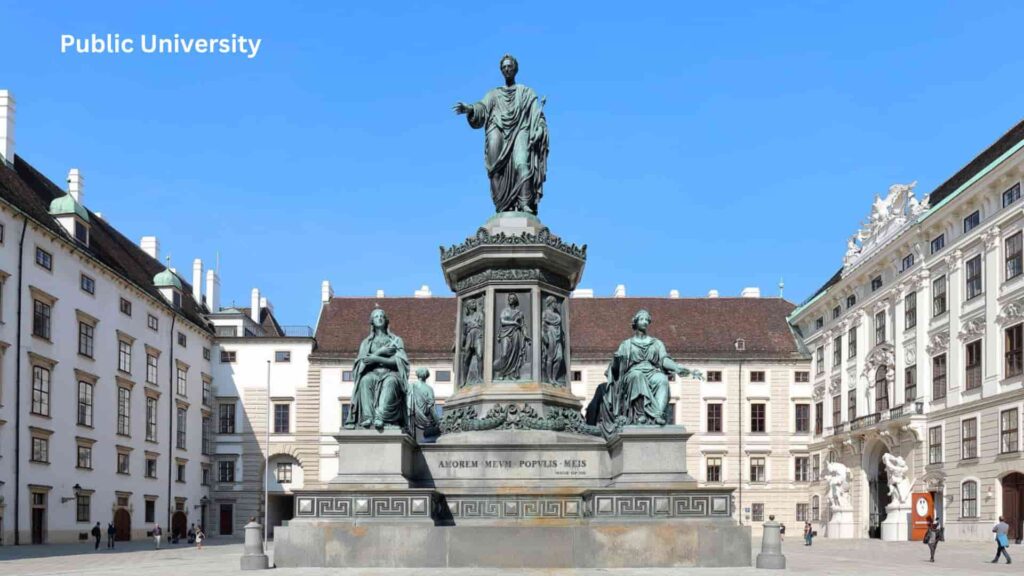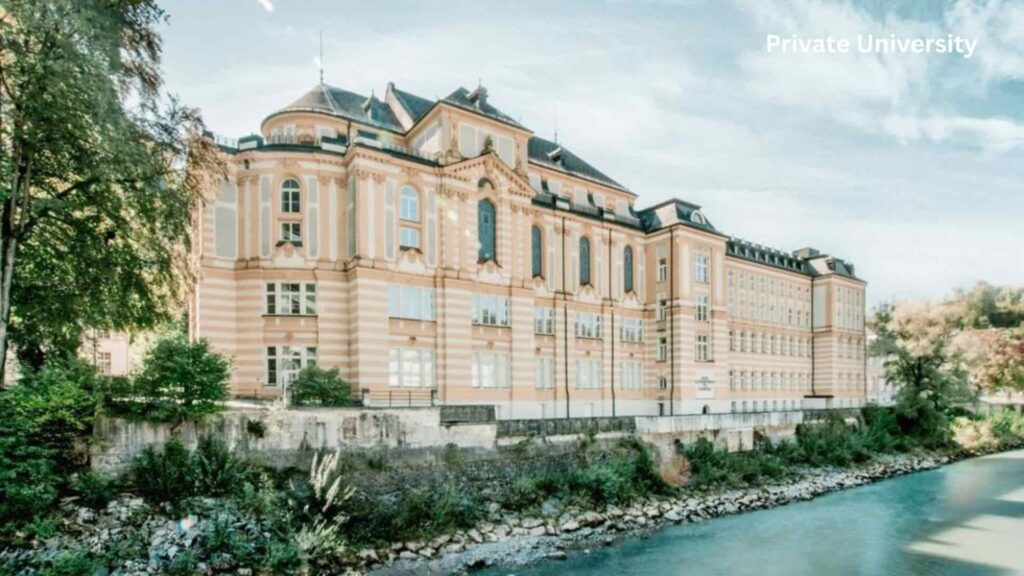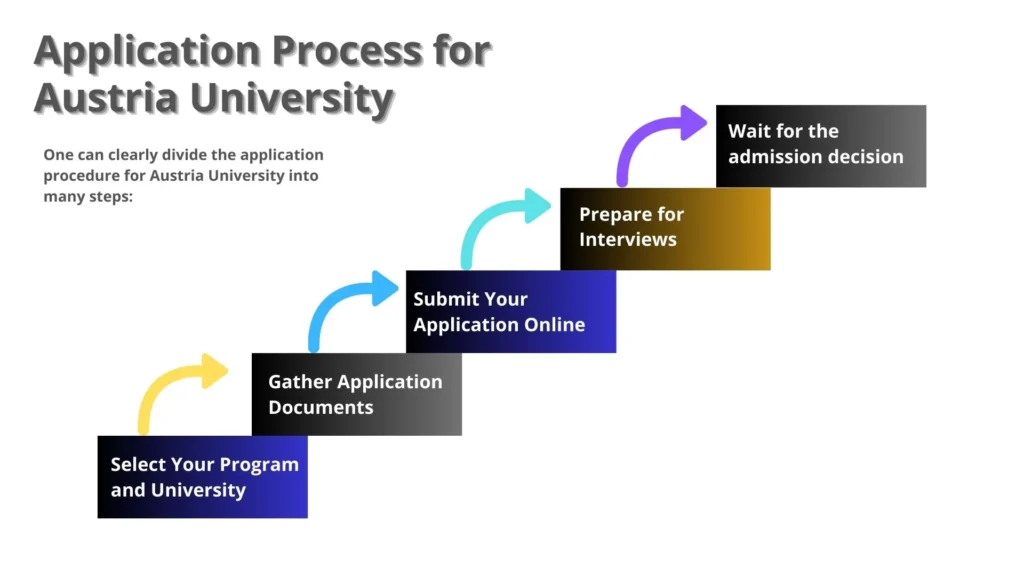Austria University Application Process: What You Need to Know
Austria is globally well-known for its rich cultural legacy, stunning scenery, and above all, first-rate educational system. There are many great universities in Austria that provide a large range of courses. The most popular universities are Vienna University of Business and Economics Austria University of Vienna, and many.
Austria appeals to overseas students because of its reasonable tuition rates, top-notch academics, and plenty of employment after graduation. We will discuss the Austria University admission procedure in this post, stressing important criteria, documentation, and advice to enable you get into the program of your choice.
Overview of Austria’s Top Universities
There are more than seventy universities in Austria that serve both local and foreign students. Public and private universities are the two categories these establishments fall into; each has special benefits.
Here is a closer view of several of Austria’s esteemed institutions:
Austria University of Vienna
Established in 1365, the University of Vienna is the biggest university in Austria among the others in Europe. It provides more than 180 courses including humanities, social sciences, and natural sciences among other areas. Particularly for international students, the University of Vienna is quite competitive and well-known for its exacting entrance policies.
Vienna University of Business and Economics
The business-oriented programs at Vienna University of Business and Economics (WU Wien) are well-known Providing degrees in business administration, economics, and international business, it ranks among the best corporate university in Europe. The strong industry ties this Austria university offers to enable students to secure internships and employment.

Austria University Haripur and Austrian University in Pakistan
Collaborative programs offered by Austria University Haripur and Austrian University in Pakistan let students in Pakistan access Austrian-standard education. These universities award degrees with international recognition and concentrate on engineering, IT, and business administration.
Types of Universities in Austria
Knowing the many kinds of universities in Austria can help you choose which one fits your academic and professional objectives.
1. Public Universities
Public universities in Austria are state-funded institutions well-known for their academic excellence and diverse range of programs. These universities offer high-quality education, popular among EU/EEA students due to lower tuition fees.
Following are some of the key features of public universities in Austria.
- For overseas students, government-funded public universities offer quite reasonable tuition rates.
- Renowned establishments, including the University of Vienna, Graz University of Technology, and the University of Salzburg, are listed by Austria’s public universities.
- Public universities teach everything from the arts to sciences, engineering, and medical courses.
- Most public universities feature sizable campuses with varied student enrollment.
Austria Public Universities List:
Here is the list of austria public universities.
- University of Vienna
- Graz University of Technology
- University of Graz
- Vienna University of Technology
- Johannes Kepler University Linz
- University of Innsbruck
- Medical University of Vienna
- University of Salzburg
- Medical University of Graz
- University of Klagenfurt
- Montanuniversität Leoben
- Vienna University of Economics and Business
- University of Veterinary Medicine Vienna
- University of Music and Performing Arts Vienna
- Mozarteum University Salzburg

2. Private Universities
Private universities in Austria are known for their specialised programs, smaller class sizes, and personalised learning environments. These universities are privately funded and often focus on specific fields such as business, arts, or health sciences.
Following are some of the key features of private universities in Austria.
- Privately sponsored and with a more specialised curriculum, private institutions in Austria provide
- Usually, having smaller class sizes allows lecturers to provide individualised attention.
- Although private institutions offer greater tuition, their facilities and creative learning environments are usually cutting-edge.
- Private colleges provide speciality courses, including digital marketing, biotechnology, and international law.
List of Private Universities in Austria:
Here is the list of Austria’s private Universities.
- Webster Vienna Private University
- MODUL University Vienna
- Sigmund Freud University Vienna
- Paracelsus Medical University
- Karl Landsteiner University of Health Sciences
- Central European University (CEU) Vienna
- University of Applied Sciences for Management & Communication (FH Wien)
- New Design University St. Pölten
- Bertha von Suttner Private University
- Gustav Mahler Private University for Music
- Anton Bruckner Private University for Music, Drama, and Dance
- Danube Private University
- Johannes Kepler Private University

Understanding the Austria University Admission Process
Applying to an Austria University calls for several actions. Here is a comprehensive overview of what you should be aware of.
Research and Select Your Program
- Research several programs Austria University offers first, including PhD, master’s, and bachelor’s degrees.
- Examine course materials, duration, language requirements, and tuition costs using the official university websites.
- While the University of Vienna is a great choice for humanities, for business degrees think of schools like WU Wien.
Check Eligibility Criteria
- Go over the eligibility requirements for the program you have selected, which can call for particular academic performance, admission tests, and language ability.
- Make sure your GPA is at least required, as many Austrian universities have stringent admissions.
- Certain programs, including engineering and medical, could call for further entrance tests.
Requirements for Austria University Admission
The degree of study and the university you decide upon determine the admission criteria. The following are typical requirements:
Academic Requirements
- Undergraduate Programs: Undergraduates must have a high school diploma or its equivalent. Some programs could need for you having taken particular courses at the school level.
- Masters Programs: Along with transcripts and academic references, a bachelor’s degree in a comparable discipline is required.
- PhD Programs: You will require a master’s degree, a thorough research plan, and letters of recommendation from past teachers for a PhD program.
Language Proficiency Requirements
Most classes run in either German or English. You must show mastery of the language of instruction:
- English-taught Programs: Programs taught in English usually require an IELTS or TOEFL score. Generally speaking, IELTs ranging from 6.0 to 6.5 are reasonable.
- Programs taught German: Especially if you intend to enrol in undergraduate courses.

Alternative Language Options: Studying Without IELTS
If they satisfy additional requirements, certain Austria universities let students without IELTS in:
- Evidence of prior English language learning.
- finishing a university preparation language course.
- sitting an English language test arranged by the university itself.
Application Process for Austria University
One can clearly divide the application procedure for Austria University into many steps:
Step 1: Select Your Program and University
Choose the course of study you wish to do and if you would desire a public or private university. To guide your decision, use rankings, course specifics, and alumni reviews.
Step 2: Gather Application Documents
Typical papers consist of:
- Completed Application Form: Accessible on the University Website.
- Academic Transcripts: Have to be converted to German or English.
- Passport Copy: Make sure your passport is current at least one year beyond the course start date.
- Motivation Letter: Tell Austria University why you wish to study the selected program.
- Proof of Language Competency: According to course standards.
- Recommendation letters: from professors or teachers.
Step 3: Submit Your Application Online
Online application systems abound among most Austrian universities. You have to register on the university portal, complete the form, upload paperwork, and pay the application cost.
For applied sciences degrees, several colleges welcome applications via centralized systems such as UAS Technikum Wien.
Step 4: Prepare for Interviews (if applicable)
Some degrees, including architecture and business management, could call for portfolios or interviews. Get ready, paying especially attention to your accomplishments, abilities, and drive.
Step 5: Wait for the admission decision.
Usually, the university reviews your application 4 to 8 weeks after you send it. About the admittance decision, you will get an email alert.

Visa Approval and Handling
Applying for a student visa comes second once you have your acceptance letter.
Austria Student Visa Requirements
- Acceptance Letter: Sent by Austria University verifying your enrolment.
- Proof of Sufficient Funds: You must prove that you can sustain yourself during your stay in Austria. This covers a scholarship confirming letter or bank statements.
- Health Insurance: You have to have current health insurance valid in Austria.
- Proof of Accommodation: Specify exactly where you intend to be lodging during your studies.
Processing Time of Austria Student Visas
Usually taking 4 to 6 weeks, the visa application process varies based on the applicant’s home country. Applying right once you get your acceptance letter is advised.
Austria University Fees
Whether you attend a public or private university determines Austria University fees:

Fees for Public Universities
- EU/EEA Students: Usually free from tuition, EU/EEA students pay a small student union charge of roughly €20 each semester.
- International students: The program and university determine whether tuition prices fall between €700 and €1,500 per semester.
Private University Fees
At private universities, fees run from €5,000 to €25,000 year. Programs include MBA or specialty master’s degrees in business and technology could be more costly.
Many private colleges give overseas students alternative payment schedules or grants.
Advantages of learning in Austria
Because of its dynamic culture, English-taught programs, and strong safety regulations, Austria is a common place for overseas students.
- Multicultural Environment: Austrian colleges attract a varied student population that gives international students an opportunity to socialize with friends from all around the globe.
- English-Taught Programs: Many colleges provide bachelor’s, master’s, and doctorate degrees in English, therefore facilitating overseas students’s study free from linguistic restrictions.
- Post-Study Work Opportunities: Graduates from Austria University can seek for a Red-White-Red Card, therefore enabling them to work in Austria for up to two years following graduation.
Scholarships and Financial Aid
Austria grants numerous scholarships to assist overseas students in paying living expenses and tuition:
Popular Scholarships
Students from outside of Europe seeking master’s degrees are eligible for the Erasmus Mundus Scholarship. Scholarships sponsored by the Austrian government for students from underdeveloped nations pay monthly stipends and cover tuition. Some Austria institutions provide international students merit-based and need-based scholarships. Look on the particular university’s website for specifics.

Top Tips for Successful Admission
- Apply early: Start your application and research process at least six months before the program begins.
- Create a strong motivating letter: Emphasise your love in the field and show how attending Austria University fits your professional path.
- Pay attention to language competency: If you are applying without IELTS, be sure your other materials are strong.
- Check for Errors: Review your application form and supporting documentation before submission.
- Maintain Regular Communication: Maintaining contact with the admissions office of the university will help you to find the state of your application.
FAQs
1. What are the deadlines for Austria University admission?
Though each university has different deadlines, applications usually close in December for summer semesters and July for winter semesters.
2. Can I study at Austria University without the IELTS?
Indeed, several colleges let applications, even without IELTS, provide alternative proof of English competency.
3. How much does it cost to study at Austria University for international students?
Public university tuition for overseas students falls between €700 and €1,500 every semester.
4. How long does the student visa process take?
Though it usually takes 4 to 6 weeks, the student visa application procedure is best started right away.
5. Do Austrian universities offer scholarships for international students?
Indeed, there are various scholarships accessible: Erasmus Mundus, Austrian Government, and university-specific ones among others.
Conclusion
The admission procedure for Austria University may seem complicated, but it becomes a reasonable effort with enough preparation and a clear awareness of the criteria. From choosing the correct path to compiling the required records, each action should be taken painstakingly to improve your chances of acceptance. Whether your goal is to attend private universities or public ones like the University of Vienna, knowing the different procedures and standards for each kind of university is absolutely important.
Studying successfully in Austria University not only for meeting intellectual standards but also for satisfying language and visa restrictions. It’s imperative that your application be timely, error-free, and whole. Just as crucial is getting enough money, either personal funds, scholarships, or financial aid provided by Austrian colleges. These tools are very important for controlling living expenditures and tuition, so international students may more easily afford education.
With its cosmopolitan setting, first-rate education, and post-study employment possibilities, Austria presents a fulfilling experience. Following the advice in this article will help you to boldly negotiate the application process and start an academic path in Austria university. Early application entries, good planning, and great drive will greatly increase your chances of getting into the university of your choice and realizing your academic goals.


